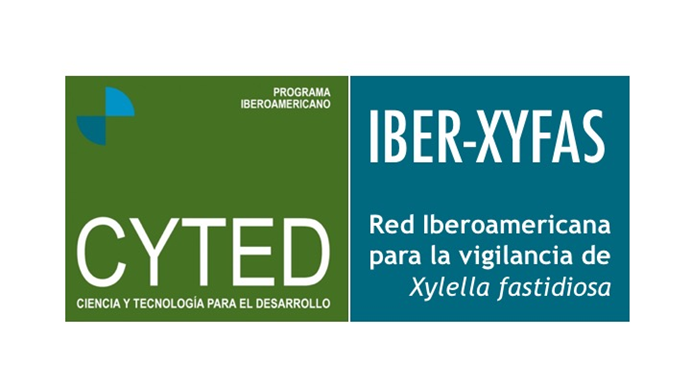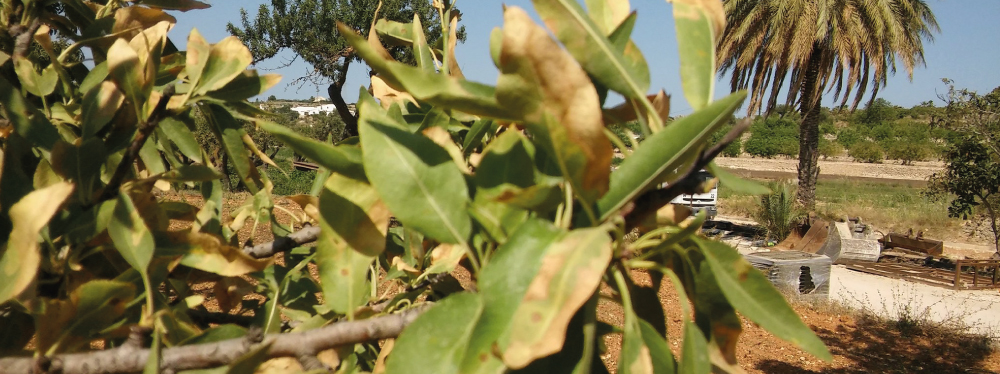IBER-XYFAS
Ibero-american network to control xylella fastidiosa
Challenge
Xylella fastidiosa is a Gram-negative bacterium, belonging to the class of Proteobacteria, which causes serious economic damage to agriculture in many American and European countries. It can infect a wide variety of plants, some of which are of great economic interest, such as vines, olive trees, almonds, plums, peaches, citrus fruits, coffee, bay leaves and ornamental plants such as shade bananas, oaks, elms, maples, or liquidambars, among others. Currently more than 350 species of host plants are described, both monocot and dicot. In many of them, the bacterium does not cause apparent damage, but works as reservoirs. The disease is transmitted by insects that feed on the xylemic fluid and act as vectors or transmitting agents.
Solution
The main objective of the Network is to exchange information and knowledge among countries affected by diseases caused by X. fastidiosa in order to collect all available data on the bacterium, its vectors, the situation of affected crops in Ibero-American countries and the ongoing prevention and control activities. This information is intended to generate knowledge that will contribute to the development of a surveillance and technological alert system that will enable local and regional governments to take the necessary measures to ultimately monitor, contain and eradicate the disease.
The specific objectives of the network will focus on the following axes: P1) Information on the bacteria; P2) Information on transmission vectors; P3) Information on the interaction of the bacteria with the plant; P4) Information on therapies; P5) Information on remote sensing methodologies; P6) Information on the environmental, social and economic impact of diseases and control measures.
Objectives, Activities and Results expected / achieved
NA

Project Reference
Red 119RT0569Funding

Duration
4 yearsStart Date
2018-08-31End Date
2022-08-31Approval Date
2018-08-31Consortium
FitoLab - Phytosanitary Laboratory, Instituto Pedro Nunes, Coimbra, PortugalInstituto Politécnico de Bragança, Bragança, Portugal
Universidade Federal do Rio Grande do Sul (UFRGS), Porto Alegre, Brasil
Scientific Research at Agronomic Institute. Citrus Research Center Sylvio Moreira (CCSM), São Paulo, Brasil
Luiz de Queiroz College of Agriculture (ESALQ), University of São Paulo (USP), Piracicaba, Brasil
Centro de Investigación en Enfermedades Tropicales. Universidad de Costa Rica, San Pedro, Costa Rica.
Universidad de San Carlos de Guatemala, Santa Elena, Guatemala.
Universidad de Chile, Santigo, Chile
Auburn University, Auburn, USA
Universidad Juarez Autonoma de Tabasco, Villahermosa, Mexico
Estación Experimental Agropecuaria Concordia INTA, Concordia, Argentina
Instituto Nacional de Tecnología Agropecuaria. Instituto de Patología Vegetal. Centro de Investigaciones Agropecuarias, Córdoba, Argentina
Diputación General de Aragón (DGA), Sanidad Vegetal, Centro de Investigación y Tecnología Agroalimentaria, Zaragoza, Spain
Instituto Valenciano de Investigaciones Agrarias (IVIA), Valencia, Spain
Instituto de Biologia Integrativa de Sistemas (I2sysbio) (UVCSIC), Valencia, Spain
Neval Grupo Farmalent, S. L., Valencia, Spain
Universidad de Valencia, Valencia, Spain
BIOPOLIS-ADM, Valencia, Spain
Elytra Agroscience Services S.L, Valencia, Spain
VALGENETICS SL, Valencia, Spain
Instituto de Tecnologia Agroalimentaria-Universitat de Girona, Gerona, Spain
Generalitat Valenciana, Silla, Spain
Instituto de Ciencias Agrarias (CSIC), Madrid, Spain
Universidad de las Islas Baleares, Palma de Mallorca, Spain
Servicio de Agricultura - Consejeria de Medio Ambiente Agricultura Y Pesca- Gobierno Balear, Palma de Mallorca, Spain
Join Research Institute (JRC) Sevilla. Instituto de Estudios de Prospectiva Tecnológica (IPTS), Sevilla, Spain
VISUALNACERT, Rafelbunyol, Spain
Institut de Recerca i Tecnologia Agroalimentàries, Cambrils, Spain
Diputación General de Aragón (Dga) Sanidad Vegetal/Centro de Investigación Y Tecnología Agroalimentaria, Zaragoza, Spain
Instituto Agricultura Sostenible CSIC, Córdoba, Spain
Institute for Sustainable Plant Protection, National Research Council (CNR), Unit of Bari, Italy










